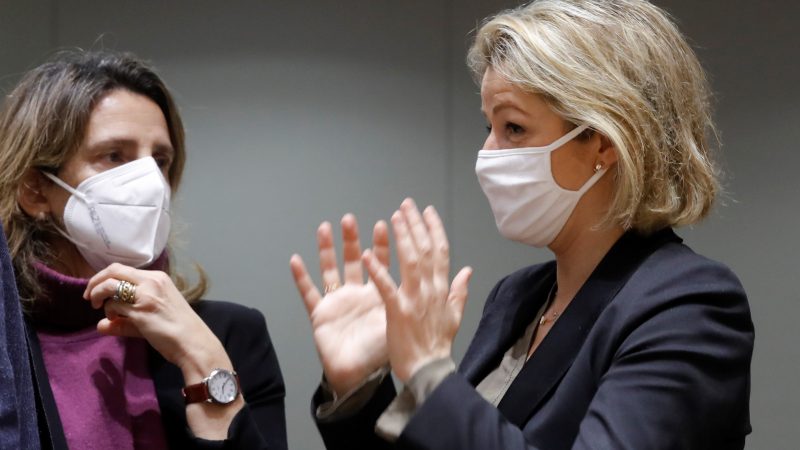Berlin think-tank positions itself as midwife of EU climate policy
A star-studded informal group including some of the hottest movers and shakers in EU climate policy was quietly established in December at the initiative of an influential German think-tank. EURACTIV has the details of the forum whose aim is to bring the EU’s ‘Fit for 55’ package of climate legislation over the line.
Initially founded in 2012 to focus on the German energy transition, the think-tank Agora Energiewende has long branched out beyond Berlin, with new offices opened in Brussels, Tokyo and Beijing over the years.
But its latest coup, the creation in December of a high-profile group of EU climate policy advisers, may be one of its boldest undertakings to date.
With its 25 high-profile members, the Agora Council for Europe is a “Who’s Who” of climate policy, with members including France’s green transition minister Barbara Pompili, Spain’s ecological transformation minister Teresa Ribera, Luxembourg’s energy minister Claude Turmes and Patrick Graichen, the right-hand man of Germany’s Vice-Chancellor Robert Habeck.
Other influential members include big names in the European Parliament, high-level European Commission officials and think-tankers, as well as leaders from civil society and European industry.
“The goal is to provide a forum for regular and confidential exchange on key aspects of the ‘Fit for 55’ package,” explained Matthias Buck, director for Europe at Agora Energiewende who is deputy chair of the group.
‘Fit for 55’ is the nickname given by the European Commission to its July package of climate policy legislation, which seeks to reduce the EU’s carbon emissions 55% below 1990 levels by 2030.
The exchanges are designed to be as free and informal as possible and are regulated by the “Chatham House Rule,” which forbids participants from being directly quoted in written accounts of the discussions.
‘It’s all about the exchange of knowledge’
Setting the agenda is Agora Energiewende, which made sure diverse interests are represented, ranging from the renewable energy sector to heavy industrial players.
On the civil society side for instance, the group includes cement industry association Cembureau and WWF, the global conservation NGO, as well as the EU consumer organisation BEUC and the European Chemical Industry Council (CEFIC).
Among large EU countries, only Poland and Italy are missing at the table.
The objective, according to the Agora Council webpage, is to “discuss views informally….with the purpose of deepening the mutual understanding of key problems and policy options,” building on the think-tank’s reputation as a bridge-builder.
“At Agora Energiewende, we have built over the years a tradition of dialogue with policymakers, stakeholders and experts. The Agora Council for Europe embodies this tradition, expanding and deepening our attention at the EU level as the ‘Fit for 55’ policy package takes shape in the months and years to come,” says the group’s webpage.
Bas Eickhout, a Dutch Green EU lawmaker who is a member of the Agora Council for Europe, believes the group can make a positive contribution to the debate.
“Agora is particularly helpful in the exchange of information, knowledge and ideas on the energy transition,” Eickhout said. “In my years in the European Parliament I have gained some knowledge and experience on how Europe functions and what to expect from the different institutions, which I can bring to that table,” he told EURACTIV.
“On the other hand, I can learn about their specific knowledge and ideas on certain themes,” he Eickhout continued. “It’s all about the exchange of knowledge.”
Agora Energiewende recently gained political prominence in both Berlin and Brussels when its former director, Patrick Graichen, was appointed to lead Germany’s new super-ministry for economics, energy and climate.
Graichen is a full member of the Agora Council and is the lead negotiator on the ‘Fit for 55’ package in Berlin, where he helps Vice-Chancellor Robert Habeck draft climate legislation. At a recent meeting of the EU Environment Council, he was sent to Brussels alongside environment minister Steffi Lemke where he took the floor for all the discussion points related to the EU’s climate legislation.
As the Agora Council aims to have its members at the same table four times a year, much of the preparatory and secretariat work is also done by the German think-tank.
“Before each meeting, an impulse paper will be sent to the members,” said Buck.
These would address a specific aspect of the ‘Fit for 55’ package, and would be developed with support from Agora Energiewende, he added.
For the kick-off meeting of the Agora Council in December, members discussed the upcoming revision of the European Emissions Trading Scheme (ETS), a participant told EURACTIV.
The discussion was probably most helpful to German EU lawmaker Peter Liese, who is in charge of drafting the European Parliament’s position on the proposed ETS revision.
Liese did not reply to a request for comment about his participation in the Agora Council.
What’s next?
As part of the French EU Council presidency, President Emmanuel Macron has highlighted one topic of particular importance: the proposal to introduce an external tariff at the EU border for imports of carbon-intensive goods such as steel, cement, fertiliser, aluminium and electricity.
As the price of emitting carbon in Europe increases, politicians fear EU firms won’t be able to compete against countries with lower environmental standards, leading some to relocate their investments abroad.
As the Agora Council will meet again on 23 February, “topics like CBAM are sure to be on the agenda,” explained Jos Delbeke, a former director-general at the European Commission’s climate directorate who chairs the forum.
France hopes to make headway on CBAM during its EU Council Presidency. With positions diverging starkly, the Agora Council’s “aim of deepening common understanding on the most pressing issues and policy options” is likely to face a real life test.
Original article from EURACTIV.
